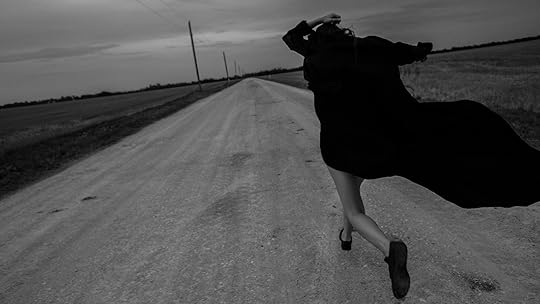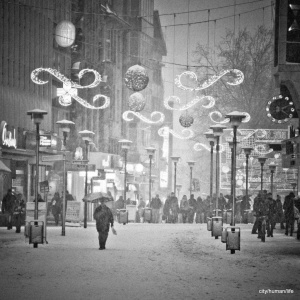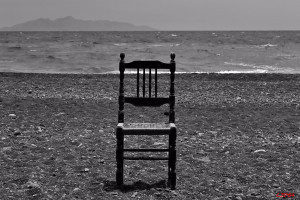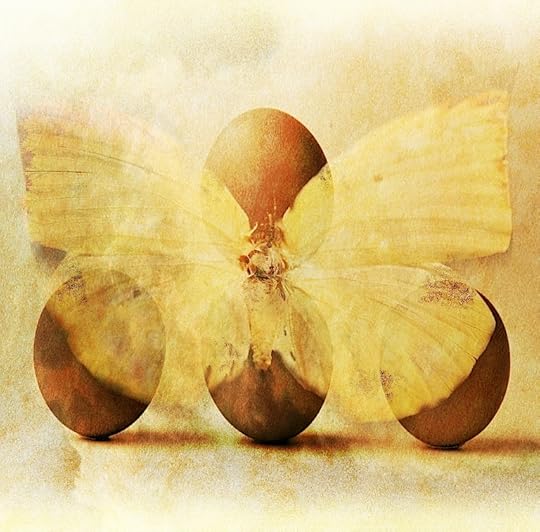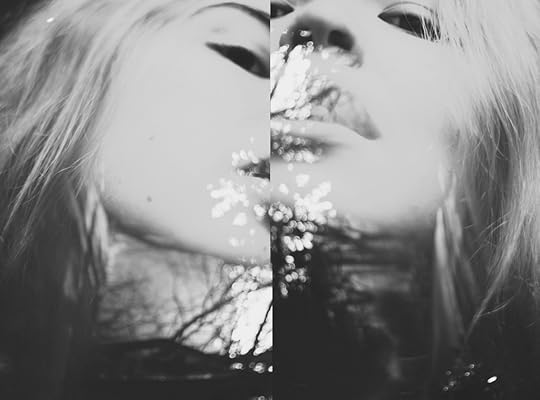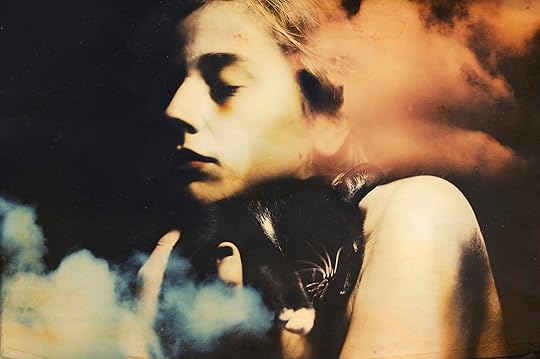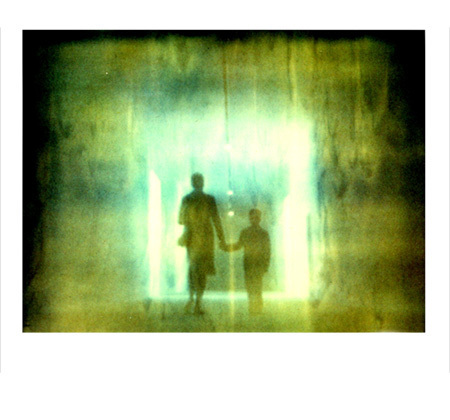Meg Sefton's Blog, page 79
January 18, 2015
the kingdom of bluebeard
I must away from him on the high road, from his jaws and greedy eyes, what I have undertaken to see and point out. My sisters call to me from the plains and their cries are plaintive, knowing, wise. I must away from him before he beats me for taking the bleeding key, the blood of women slain behind his door. “Never say this,” he has said. “Never do that.” “Do not wear…” “Do not ask me….” “Do not make…” “You are worthless in your passions.” Shreds of me are falling off among the fields, my feet are fleet, my heart beats fast within my breast. I will run before I am taken.
On the road I meet a woman before a shack. She says “Come in my child for the highway after dark is no place for a flesh and bone woman.” She took me into her twig abode saying women sometimes build their own houses with all the strength they have to lift and tie, but��there were some who knew what rocks to place before the doorways, the open places. A ring of stones surrounded her bleached cottage, pitiful looking against the wind. “No spirit will enter,” she said and dipped a ladle into a pot of soup swaying over a fire.
The liquid made my tongue to dance in my mouth and I said: “I have not spoken for a long time. I have been mute.”
She scooped up a clod of wet earth from her floor and placed it on my forehead, trails of mud��dripping down my cheeks. “You have been stone. I will make you clay.”
She formed my head, my neck, my chest, my arms, my hands, my abdomen, my hips, my pevis, my rear, my legs, my feet. She set me before the fire and had me warm. She covered me with water and put breath in my nose and what had been before became almost like a dream. And she took me out beside the largest stone before her doorway, where we were guarded, lifting her craggy hand to the sky. “I will make it as if you have not been ruled by the hours. I return to you the time.” And the sky became as if full of diamonds and I remembered my mother sending me out to my groomsman, hopeful yet worried, and my sisters, crying. “Your kin wait in a dull place,” she said, knowing my thoughts. “I will unstop your mouth and you will have the courage to speak to them about this thing that has passed before your eyes and in your heart and body but which rule over you no more.”
She gave me a new cloak. How she could afford it I was not sure. She seemed to be literally of earth. It was gilded and long and fur lined. She spit in my mouth and it was like honey. She embossed my face with the tints of bark and my beauty was returned to me, long after the��cycles of rapacious furry and inexplicable neglect. She encased my head in her hands and I remembered soft things like petals and dreams of babies and my mother’s cool arm.
Away again on the road in the morning light, an amulet of fire against my breast, a dagger tucked beneath my cloak to ward off minions who would seek to infect me, to have me believe I am nothing but flesh to be consumed as if there was no other purpose but for another’s passing whim. I was remade in the night, old dreams wracking my body as the woman burned bay leaf branches over my breast. I was no longer who I was, ever, I was some former version though not completely. I knew now how to fight and whom. “Your mother and sisters have never known these things,” said the woman, “you must�� teach them,” she said, dipping�� the dagger in poison. “You must�� protect your dreams and they theirs. There is no one else to act anymore on a woman’s behalf. It is coming, a dark epoch, the evil that prevails except in places it is not allowed breath.”
Beyond the plains lie the mountains�� where my mother and sisters live in��the castle of my good father, but he grows old and weak and feeble-minded. Our tasks lie immense before us not the least of which defeating the spirits which rise up from the plain and take residence in the heart, they have nowhere to go and no special aim, their presence is as when wind is sucked into the caverns. They will take up residence in the feeble and those improperly girded, the empty and aimless. They nip at me as the roiling sky bites at my back, the gold of my cape deflecting the penetrating darkness.

December 18, 2014
North Rhine affair
I want to meet you this Christmas under a new sky, not Florida’s, not like the night we watched the Christmas parade and the snow made of soap bubbles and the trombone your son never played because the one that worked was somewhere else.
I want to meet you on a snowy city street: I, dressed in white, a long white coat, and you in dark wool.
I want you to smile at me as if I’m the only woman you will ever want. I want to know you love me and are concerned about me. I want to hear you say the words. I want to hear you say��my name��Margaret. I want you to kiss my lashes.
You don’t know how much I have been yearning for an arm that fits neatly over my shoulder, a laugh that embraces me, care that could be lavished on a queen. So many lonely nights, terrified of my dreams, longing.
I have wanted to make you into this, this dream fulfillment and it has been unfair. A person isn’t what they’re not meant to be. How I have craved gentleness and attention. You are so handsome, yet it has been unfair – my dreams –��an imposition.
You were meant for another, one who wants for nothing, at least not too many words or undue attention, one who understands a certain approach. Or maybe she will be the one to receive your attention because she is the one for you.
After I acknowledge you have only been a dream, I will walk away into the snow and leave the ghost of your body. There will be bells from another man’s sleigh and when he thinks – this woman should not be allowed to walk like this nor should she feel��hunger or any kind��– he will lift me up and ask me if I am ok and��I will begin a journey.

a personal note
Happy Holidays. I hope you do not mind me speaking directly. Maybe you can indulge me, please, though I usually “tell it slant,”��minding this principal of Emily Dickinson.
I thank you for reading my blog this year. Last year, I published a flash fiction “Christmas in Florida” journal and hope to return to it next year.��I received some great submissions. This year, however,��I want to complete my tale of unease, among shopping for Christmas, planning a trip, wrapping up year end things. I have the perfect cocoa ready and waiting for�� a good writing session, which usually takes place sitting on my bed though I have set up “writing stations” throughout the house. All for naught. I write where I dream.
I don’t have much to say, unslant.��I have been watching American Horror Story and have been quite unsettled, but the unsettling has good effect: It causes��me to re-evaluate, take stock. Maybe that is why those Victorians loved a ghost tale at Christmas. Being unsettled is a precursor to finding beauty in one’s life, finding rest, and if the story comes with a bit of a morality tale which many great tales of unease do, there is the added benefit of having the chance to see, and maybe, as a response, “do.”
Drink your eggnog, now, my good friends – writers, readers, editors, artists extraordinaire – and may visions dance in your heads.
Margaret
A Holiday Suprise – Elan Mudrow’s Santa #4270 – Enjoy

December 3, 2014
a tale of two men
1.
There once was a man who lived all deep in a pine forest. Every evening, he gently laid a new nightgown beside him in his big iron bed. Every evening, he set two extra places at his broad table. Every week, he bought food and clothing for his family so the family he did not yet have would never be hungry or cold. He bought toys for the child, jewelry for his wife. Every night he prayed to his god fervently: “God, please give me a wife I can love and cherish, please give me a child. I am prepared to be your humble servant in all things related to these matters. I am a man, full of love. I will love my wife as my own flesh, my child as the flesh from my wife’s womb.”
One morning, the man woke to two tiny feet pressing against his shoulder. A baby! The man praised his god. He clothed the baby in the garments already bought for the child and gave him the milk stored in his home. But he was puzzled how to present the child to the town since he was unmarried. He knew he should trust god and bravely and simply said, when anyone asked: “This is my new baby, praise god! I was alone in the world and god has seen fit to grant me a son.” Adoption laws being what they were in the country, everyone shrugged, congratulated the man, and went on about their own hectic lives. The man would know soon enough how hard it was to be a father and if he had strength enough for it he deserved the fulfillment of his prayers, for good or ill.
One night after the child had gone to sleep, the man sat on his porch facing the woods. In these moments he felt how lonely it was with no one to share the baby. Who would admire with him the gurgles and coos? Who would watch with him the baby’s first steps; listen to the first word the baby uttered? The pines creaked and the sound of the wind soughing in the bows amplified his loneliness and he prayed: “God, you brought me a miracle. You see how I have handled what you have seen fit to give me. If a bad father gives a stone to the son who asks for bread, how much more will you give?”
Carried along on the wind was a sound barely distinguishable from the soughing of the pines. It was a woman crying. The man searched his porch, but he could not find the source. He went out into the woods and their under the shifting shadows was a woman, dressed in a white gown, shivering.
“Where have you come from?” said the man, putting his heavy wool coat around her shoulders and lifting her from the forest floor so she would not further damage her tender feet.
“I have given you a child,” said the woman, “a child I had no means of supporting. And now please sir, I wish to hold my son.”
The man’s heart filled with pity and with something else besides for the woman was very beautiful and young.
“You may hold your son for as long as you wish. I will make it possible for you. I will give to you whatever you require.”
And seeing there was no ring on the young woman’s finger, she became the bride of his heart and he did not question anything, only praised his god for his good fortune. When the woman slept in his bed, holding her son, the both of them twin images of peace and warmth; he knelt all night in the wood in wonder.
2.
A man was tired of his wife. It was well known how many errors she had committed and the number of errors was well past her ability to make up for them, even if she began engaging in acts of contrition the first moment he expressed his discontent and worked continuously, around the clock. His wrath had built up. Number of laundry baskets not completed per day. Number of times the dishes were stacked in the sink. Number of times she was with her foolish friends rather than at the market as promised. Number of times she was late getting the children to school. Number of pounds she had gained since their marriage. Number of times she did not attend worship services to his god. Number of times he had come home from work to see her face and hair in their natural state. Number of times she had indulged in her projects and made cold meals rather than cook. Number of times she expected him to help her while she pursued her education. Number of times she disappointed his extended family. And so she became a terrible wife among those who worshiped his god, became an outcast and despised.
He prayed: “Oh god, why have you given me such a terrible wife? As a young man growing up, I tried to do the right thing, and yet you did not see that I was worthy of your grace and favor?”
He prayed this at night, on his knees, in the living room, so that his wife heard, though their children slept the sleep of the innocent. It frustrated him how much they forgave her. But of course they knew nothing else. But being a man of ambition and righteousness, he knew the ways of the unrighteous and what would eventually befall her. Here is what he knew: The path of the righteous is like the morning sun, shining ever brighter till the full light of day. But the way of the wicked is like deep darkness; they do not know what makes them stumble.
Frustrated with his god, heartbroken he had not been loved as he expected to be, he existed in the house with his wife, neither praising nor belittling her, pouring his love and attention onto his children so that even if she became an angel to them, he would be all the more perfect.
As it happened, she became wayward and ruined and he was enabled to be rid of her in all good conscience in the sight of his community.
“Thank you god,” he said, “for this opportunity to start again.” And all of the man’s wishes were granted, according to the dictates of his god.

December 2, 2014
A Serialized Tale of Unease at Christmas: Kelda, part one
(I made changes to this story in the night and somehow lost them. I will get back to it. In the meantime, I invite you to enjoy the tale, above. I will provide a revised copy of my tale of unease shortly. As you may know, it was a Victorian tradition to tell ghost stories by the fire at Christmastime. May you consider reading ghost stories this Christmas and if you know of collections, novels or sites that feature a great tale or tales, please inform me and if these are simpatico with the aesthetic of the site, I will put��in a little plug. I hope this season finds you at peace. Best wishes – Meg.)
It started on the balcony of the hotel.��One night��a woman named Kelda sat outside a room she was sharing with her husband and child��and smoked cigarettes she kept hidden in the inner lining of her purse. The balconies were small, close together, each accommodating only a table and two small metal chairs. She thought when she sat down, the man sitting on the balcony next to theirs would go back inside his room, his privacy now invaded by her presence, but he stayed and the ice clinked inside his glass and she guessed the amber liquid was Scotch, what her father drank at five every afternoon, single malt. The way he held his glass reminded her of him as well, held his glass like him. He didn���t say anything to her and neither did she. It was a relief to be quiet sitting outside under the moon and above the palm trees and because the swimmers down in the pool had gone in for the night there was only the stone fish statue in the middle of the pool, chlorinated water spewing from their puckered lips, their tails up in the air, fanning out, bellies together.
She didn���t say anything but liked the look of him and that he was quiet and left her alone.
The next day at the pool, she saw him again. Her daughter Abbie was in an inflated pink ring and she, standing beside her, as stone-like as the fish, felt him pass along the pool���s edge. He wore navy swim trunks and a white towel around his neck. He was as old as her father and she was thirty five.
Abbie did not know how to swim, but wanted to play with an older girl who was there with her parents. The girl could swim out into the middle of the pool and climb onto the stone fish, though when the lifeguard was there, he blew his whistle. Abbie pointed at the girl, and she hung onto her child���s pink tube, the French braid in her hair becoming sodden, the tendrils of her hair trailing. She wondered if the man was looking at her.
���Where are you going?��� her husband had asked her that morning. He was making their cups of complimentary coffee. They were there for a city planning conference. Architects and engineers were pitching their designs at a conference room.
���I don���t know,��� she said. She had felt a stab of guilt when she picked up her daughter from the crib. It is doubtful her husband knew she sat outside the night before communing wordlessly with a stranger. He sleeps every night, without fail.
There were more children out now and Abbie started to fall apart, to whine and point to toys she wanted to play with, toys that belonged to other children. Kelda needed to take her in for her morning nap, but the desire to make eye contact with the man again, to be near him for just a moment, plagued her. He had been sitting on a lounge chair, ordering drinks, and he laid back, his face toward the sun, his chest bare. The smell she imagines surrounding him is that of booze soaked skin. She pushed through the water to his side of the pool, keeping the back of her head to him, but she feels his eyes on her, she is sure of it. She pretends she has crossed the pool to retrieve her child���s toy.
���That���s mine!��� says a tiny child with her ringlets.
���Oh, I���m sorry!��� says Katinka, not sorry.
���You came over here, and you stole it!���
Kelda handed it to her.
The man had a deep, rasping chuckle. Heat rose on Kelda���s neck. She moved with Abbie out into the center of the book to feel the cool splash of the spitting dolphins. She helps Abbie climb up to the podium supporting the fish and they sit together, stretching their hands out into the spray. Kelda had done this for him, is sitting in this way but she does not look at him only enjoys his cool gaze.
Her husband is not in the room when they return. He is in a meeting. She dries Abbie���s hair with a clean towel and puts her in her nightgown. She brushes her hair and kisses her plump cheeks and puts her into the crib, covering her with the blanket they brought from home.
He was still out by the pool. He��was looking��at the dolphins and smoking. He was wearing a shirt now and he was quiet and still as a stone. She looked at him through the sheers so he will not be able to detect her should he look her way. The scene below appears muted through the soft fabric, the sun shining golden through the plume of water and��she watched him as though she were watching an actor on stage through a scrim. A waitress comes by to take his drink order. She appeared to be telling him something else while shaking her head, “no.” She shifted and pointed to the hotel. He put his cigarette out in a glass but then he asked her something and handed her money. She nodded and left. He lit another cigarette.

A Tale of Unease at Christmas: Kelda, part one
It started on the balcony of the hotel.��One night��a woman named Kelda sat outside a room she was sharing with her husband and child��and smoked cigarettes she kept hidden in the inner lining of her purse. The balconies were small, close together, each accommodating only a table and two small metal chairs. She thought when she sat down, the man sitting on the balcony next to theirs would go back inside his room, his privacy now invaded by her presence, but he stayed and the ice clinked inside his glass and she guessed the amber liquid was Scotch, what her father drank at five every afternoon, single malt. The way he held his glass reminded her of him as well, held his glass like him. He didn���t say anything to her and neither did she. It was a relief to be quiet sitting outside under the moon and above the palm trees and because the swimmers down in the pool had gone in for the night there was only the stone fish statue in the middle of the pool, chlorinated water spewing from their puckered lips, their tails up in the air, fanning out, bellies together.
She didn���t say anything but liked the look of him and that he was quiet and left her alone.
The next day at the pool, she saw him again. Her daughter Abbie was in an inflated pink ring and she, standing beside her, as stone-like as the fish, felt him pass along the pool���s edge. He wore navy swim trunks and a white towel around his neck. He was as old as her father and she was thirty five.
Abbie did not know how to swim, but wanted to play with an older girl who was there with her parents. The girl could swim out into the middle of the pool and climb onto the stone fish, though when the lifeguard was there, he blew his whistle. Abbie pointed at the girl, and she hung onto her child���s pink tube, the French braid in her hair becoming sodden, the tendrils of her hair trailing. She wondered if the man was looking at her.
���Where are you going?��� her husband had asked her that morning. He was making their cups of complimentary coffee. They were there for a city planning conference. Architects and engineers were pitching their designs at a conference room.
���I don���t know,��� she said. She had felt a stab of guilt when she picked up her daughter from the crib. It is doubtful her husband knew she sat outside the night before communing wordlessly with a stranger. He sleeps every night, without fail.
There were more children out now and Abbie started to fall apart, to whine and point to toys she wanted to play with, toys that belonged to other children. Katinka needed to take her in for her morning nap, but the desire to make eye contact with the man again, to be near him for just a moment, plagued her. He had been sitting on a lounge chair, ordering drinks, and he laid back, his face toward the sun, his chest bare. The smell she imagines surrounding him is that of booze soaked skin. She pushed through the water to his side of the pool, keeping the back of her head to him, but she feels his eyes on her, she is sure of it. She pretends she has crossed the pool to retrieve her child���s toy.
���That���s mine!��� says a tiny child with her ringlets.
���Oh, I���m sorry!��� says Katinka, not sorry.
���You came over here, and you stole it!���
Katinka handed it to her.
The man had a deep, rasping chuckle. Heat rose on Katinka���s neck. She moved with Abbie out into the center of the book to feel the cool splash of the spitting dolphins. She helps Abbie climb up to the podium supporting the fish and they sit together, stretching their hands out into the spray. Katinka has done this for him, is sitting in this way but she does not look at him only enjoys his cool gaze.
Her husband is not in the room when they return. He is in a meeting. She dries Abbie���s hair with a clean towel and puts her in her nightgown. She brushes her hair and kisses her plump cheeks and puts her into the crib, covering her with the blanket they brought from home.
He is still out by the pool. He looks at the dolphins and smokes. He is wearing a shirt now and he is quiet and still as a stone. She looks at him through the sheers so he will not be able to detect her should he look her way. The scene below appears muted through the soft fabric, the sun shining golden through the plume of water, she watching him as though watching an actor on stage through a scrim. A waitress comes by to take his drink order. She appears to be telling him something else. She shifts and points to the hotel. He puts his cigarette out in a glass but then he asks her something and hands her money. She nods and leaves. He lights another cigarette.

November 22, 2014
a tale of love’s mystery
Katya ran her finger over the round warm ceramic of the coffee mug. She had to admit to herself, it was a comfort to have this portion of her life, this portion with Nina, finished. Though just as soon, she was horrified. Her friend had died an awful death, sick from cancer, alone except for Katya with whom she split rent, estranged from wealthy parents, divorced, with one selfish daughter who hardly visited. Katya believed herself to be a terrible person for thinking about her own relief.
In a silly moment, Nina had asked her to pour a cup of coffee on her grave at least once a week, maybe more, for as long as she was missed, then Katya was to be free of the routine. They drank bottomless coffee at a diner during mornings they worked in shops on Park Avenue. Nina also asked Katya to burn a letter that she had written out and placed in her jewelry box. This was more serious and yet also involved performing an act over her grave. Nina made Katya swear not to look at the letter before her burial.
One day after work, Katya stopped by Nina���s grave. She pulled Nina���s letter from her purse. It was in an envelope, sealed, and written on several sheets of small square pink papers, the stationary she started to use near the end of her life to make out grocery lists and requests for Katya. It read:
Dear Katya,
You have been my sole confessor in these last few years and on you has fallen a great burden and for that, I’m sorry. Had I allowed myself to entrust my worries and cares to anyone else, I would have. Maybe it was the illness that stirred up fear in me but in my growing physical weakness, I could not always trust others to be as tender with my heart. People are a bit like animals in this sense, especially when there is a sick person among them. But you, dear Katya, have been more than humane.
I am scared of dying, because of bitterness I have inside, bitterness I fear will keep my spirit wandering. I am scared of my sins. I am scared of the reality of the woman I’ve been, the woman I fear my daughter sees and the woman God has punished with disease. Therefore I have left this one task up to you, to burn this list of the things I have held onto in bitterness and also the sins I have committed. Please leave no corner of these papers intact, but burn them wholly over my grave and let the cinder mix with the soil and be my penance, my last confession. I’m not Orthodox, as you know, I have no priest. Please, dear Katya.
Forever yours,
Nina
It rained the morning Katya intended to burn the papers. She was so surprised by the fervor of the note and the length of the list. She sat out beside her grave longer than she had anticipated and her coffee grew cold and she fed the grave what was left of her drink but it was too wet to burn the papers. After work that night she sliced vegetables and brought water up to a boil in their lonely apartment. She ate and watched TV and went to bed but felt in the moments before sleep a presence watching from the corner of my room. Was it Nina?
She was able to burn the list of Nina���s sins the next day and prayed that her soul would be released from the burden of the guilt she felt, from her bitterness. And yet she noticed as she burned the paper, the soil was dry as if from drought, even though it had rained through the night. She bought a watering can and from that time on, watered Nina’s grave every day. To no avail. It drank in every drop of water fed to it and produced nothing. It lay barren as the day she was buried. No grass grew. No flowers that were planted there would thrive. Had she missed some opportunity to make things right for Nina that first morning she sat beside her grave, procrastinating until it rained and it was too wet to burn her letter?
Several years later she met Nina’s daughter. The young woman came to the apartment to find out how things had been for her mother during her illness. Katya revealed the mystery of the gravesite. She was careful with her description of the letter.
“I’m sure my mother was upset I never called or came to visit,” said the young woman.
Katya remained silent.
“I will try to water her grave. Maybe it will work for me.”
The grave did not respond to the daughter’s ministrations.
Again, Katya felt the intensity of a presence in the corner of her room that evening.
She decided to write to Nina’s parents and friends and asked them to visit. They knelt beside the grave, tending to the soil, but the plot of land rejected their efforts.
Perhaps there was something perfunctory about how they went about things, Katya considered. Perhaps this was the difficulty. She did not know how to change this since likely there were so few who truly loved tending a grave. And sadly, few truly seemed to love Nina. The cause of this seemed to have nothing to do with Nina herself. It was just her fate. Any grave tending would be perfunctory. Even Katya had not been the friend Nina needed.
One night a man knocked on the door. It was New Year’s Eve. Katya was not going out and had not expected anyone. She did not feel in the festive spirit.
The man, she noticed, had skin as white and translucent as parchment. His hair was a soft yellow. “I have come to pay my respects to Nina.” When Katya told him the plot number, he watched her with his clear blue eyes, a blue she had rarely seen.
She went back to Nina’s grave before heading to the shop a couple of days later. A profusion of lilies grew there from soil as rich as loam.
The only thing Katya could figure in the weeks following, as flowers continued to bloom there, in the space where an unregenerate woman lay, is that someone loved her, someone whom Nina had not remembered or someone was alive whose love, until then, had remained undeclared.


October 9, 2014
pluck my wings
I want to hate you but I am afraid if I hate you, I will hate me. How can I restore that child-faith that the world was good just because I believed in it? And now that I don’t believe in it, I am convinced it reeks though it may simply be the stench of my own body. How I want to love you and love the world.
How dare you destroy what I thought of God. But I will forgive you because I want to love me.
How dare you abandon me in my darkest night. How unnatural of you.
If I severed the tie and made official what is now only implicit, it would be a form of self-hatred, but so is not saying anything, so here begins my anthem.
I do not love you. But I forgive you because I cannot hate myself. And if I don’t talk to you it is because I am busy loving me.
And in my silent meditation, I am only making official the not talking, something you made official in your heart.
There was no agreement, your not addressing me personally as your child. You did not say: Hey, how about being a recipient of mass mailings and afterthoughts while you are undergoing the biggest challenge of your life? Though I sound angry, it is just the sound of me choking on my own heart. I didn’t say I know how to love myself very well.
God is my higher Love. I used to find my God in the world out there, in what He has made. I am sure that is where my Father and Mother hide, and I will find them.
You will not make me small because of your neglect or your disapproval or whatever this is. Though my new words of liberation are awkward, though this is a mess, I speak what comes from my mouth and blood is coming out and so are shards of glass and so is the worst writing I can ever imagine, but I will not hate it because I will not hate me. I will not give you that. I will not do that to myself.
If you opened the door to a cage of a captive bird, the bird would not fly out but I wonder what would happen if he opened the door himself, with his beak or whatever.
This is almost like a bad stand-up routine but I won’t criticize it because I cannot hate myself.
You promised me something, almost in the form of a contract, and every day for a year and a half, you broke it, and that has broken me, though it didn’t begin there, what is broken. It just made it complete. But thankfully, I still find I have enough of myself to work with. It is thanksgiving soon. I will give thanks for that.
My door is open today and the air is fresh. Someone made a comment yesterday about the brilliant quality of the light and I thought yes, it is lovely, and the clouds look so crisp. The light is spilling into my bedroom window now and the light beckons.
And I cannot remember what started this post….I just can’t remember.


October 7, 2014
my note to the world
I do not mind living for you. You are my note to the world. Foolishly, I have believed, at times, I should write other notes. As it turns out you are the biggest, most important note there is.
If life contained a million lifetimes, I would: hold your hand in each one, run my finger through your hair in every day of each, kiss your forehead whether you are sick or well, take you to a million lifetimes of soccer practices, watch a million lifetimes of your games, drop you off for a million lifetimes of first dates, drive you to a million lifetimes of first days of school, take you to a million lifetimes of movies and buy you buckets and buckets of popcorn.
My role is dwindling now my young one, just in time for me to fully appreciate what I am about, the raison d’etre of my magnum opus to the world. You said you would drive your friends when you got a license, you speak openly of missing the friends who have moved away, you speak appreciatively of the friends you have now. How my tears run silently down my face when I think of what you are.
The majority of my life has passed before me. You are now your own best work. I speak into the air and if you wish to catch a falling leaf of a word of mine, you put your hand out, but you do not need leaves. What usage, leaves, but for the fire?
May God forgive me, but I am proud. May your song never end.
Bless my mother on this, the day of her late son’s birthday.


October 5, 2014
world’s only box dweller
Remember that day I gave the man with a face on fire the one dollar bill when he asked for the fare to go home to see his family and he replied “I am probably the world’s only box dweller” and you said not to worry about it, not to think of him anymore even when he also said to me “you’re the reason vets like us come back from the war and shoot people.” We later went down to the beach on that holiday when we would normally have been with other people but here we were thrown together and in a hectic mass of humanity, down by the pier, as if the ocean had belched us onto the shore. People had set up make-shift encampments under the massive structure, deceiving everyone with its capacity as a bulwark against the elements though no one would be able to sleep there as shade was its only offering.
I said I will not take from the pipe even if I’m in a lot of pain and you said that is a lot of senselessness and I said there are a lot of ways people numb themselves. Whatever I said was dictated by my white girl reaction to the drum circle and the beautiful dancers not far away. You just can’t let go, can you, you said. I said so what. I was still upset by the box dweller, murderously unhappy with my dollar but the focus on what I believed I deserved was a relief. The world’s only box dweller had a point. The reason I was no longer a family with someone else was my fault which was the reason I was with you which was the reason I had come into contact with an angry vet who threatened to kill me.
You insisted on the tacos with the two tortillas, a huge dish. You insisted on the appetizer. You always made sure there was an equal division of expenditure. You wanted your pound of flesh though I’d not cheated you out of anything that I knew of but that was just it you had been sent to exact something from me, something I owed in a more universal sense and that close accounting I knew I deserved too. The restaurant on the pier was hot. I could not stop sweating. Below, the surf and bikini contestants were going home. I said do you love me you said yes of course and this kind of question and response had been as regular as the ebb and flow of the tide and so there was something unconvincing in it, of that I had felt since we first used the word love and how did I know that was the last time I would use this word with you and how did I realize there was no shelter.


Meg Sefton's Blog
- Meg Sefton's profile
- 17 followers


